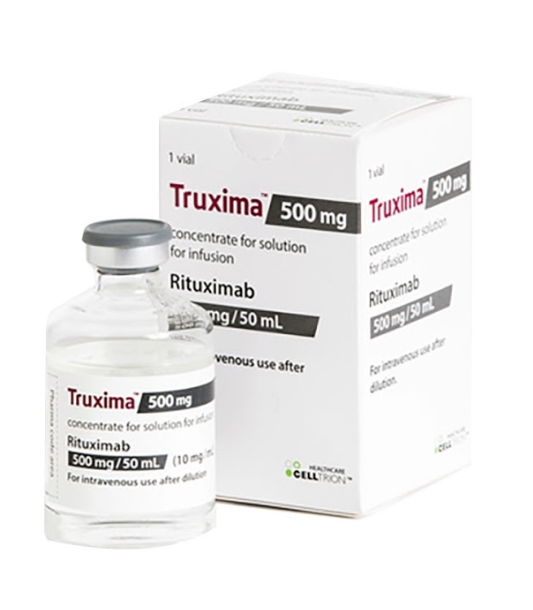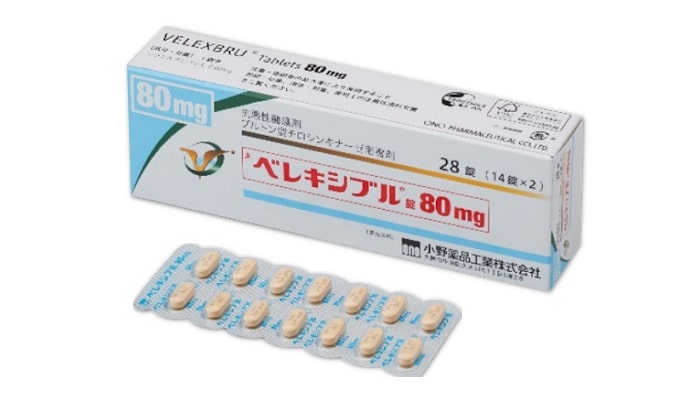Truxima (rituximab) vs Velexbru (tirabrutinib hydrochloride)
Truxima (rituximab) vs Velexbru (tirabrutinib hydrochloride)
Truxima (rituximab) is a monoclonal antibody that targets the CD20 protein found on the surface of B cells, and it is commonly used in the treatment of certain types of non-Hodgkin lymphoma, chronic lymphocytic leukemia, and rheumatoid arthritis. Velexbru (tirabrutinib hydrochloride) is a small molecule inhibitor that targets Bruton's tyrosine kinase (BTK), and it is used in the treatment of B-cell malignancies, such as mantle cell lymphoma. When deciding between the two, a patient should consider the specific type and stage of their disease, potential side effects, and the mechanism of action of each drug, as well as consult with their healthcare provider to determine the most appropriate treatment option for their individual condition.
Difference between Truxima and Velexbru
| Metric | Truxima (rituximab) | Velexbru (tirabrutinib hydrochloride) |
|---|---|---|
| Generic name | Rituximab | Tirabrutinib hydrochloride |
| Indications | Non-Hodgkin's lymphoma, chronic lymphocytic leukemia, rheumatoid arthritis, granulomatosis with polyangiitis, microscopic polyangiitis | B-cell malignancies, such as mantle cell lymphoma |
| Mechanism of action | CD20-directed cytolytic antibody | Bruton's tyrosine kinase (BTK) inhibitor |
| Brand names | Truxima, Rituxan, MabThera | Velexbru |
| Administrative route | Intravenous infusion | Oral |
| Side effects | Infusion reactions, fever, lymphopenia, chills, infection | Neutropenia, thrombocytopenia, diarrhea, fatigue, musculoskeletal pain |
| Contraindications | Severe infections, severe immunosuppression, hypersensitivity to rituximab or mouse proteins | Hypersensitivity to tirabrutinib or any component of the formulation |
| Drug class | Monoclonal antibody | Tyrosine kinase inhibitor |
| Manufacturer | Celltrion, Genentech | Ono Pharmaceutical Co., Ltd |
Efficacy
Truxima (rituximab) Efficacy in Lymphoma
Truxima, a biosimilar to the original rituximab, is a monoclonal antibody that targets the CD20 antigen on the surface of pre-B and mature B lymphocytes. It is used in the treatment of non-Hodgkin lymphoma (NHL) and has shown efficacy in both newly diagnosed and relapsed or refractory cases. In clinical trials, rituximab, in combination with chemotherapy, has been shown to improve overall survival and progression-free survival in patients with diffuse large B-cell lymphoma (DLBCL), the most common subtype of NHL. Additionally, rituximab has been effective in treating follicular lymphoma, significantly prolonging progression-free survival when used as a maintenance therapy following initial treatment.
Velexbru (tirabrutinib hydrochloride) Efficacy in Lymphoma
Velexbru, known generically as tirabrutinib hydrochloride, is a Bruton's tyrosine kinase (BTK) inhibitor. It has demonstrated efficacy in treating B-cell malignancies, including certain types of lymphoma. Tirabrutinib has been studied in patients with relapsed or refractory mantle cell lymphoma (MCL) and in Waldenström's macroglobulinemia, showing promising results in reducing tumor burden. The drug inhibits BTK signaling, which is essential for the growth and survival of malignant B-cells. Clinical trials have indicated that tirabrutinib can induce high response rates in patients with MCL, with a significant proportion of patients achieving partial or complete responses.
Combination Therapies and Off-Label Use
Both Truxima and Velexbru are often used in combination with other therapies to enhance their efficacy. Truxima is frequently combined with CHOP (cyclophosphamide, doxorubicin, vincristine, and prednisone) chemotherapy regimen, which has become a standard of care for certain types of NHL. Velexbru, while not as widely used as rituximab, has potential in combination regimens, particularly for patients who have relapsed or are refractory to other treatments. Off-label use of these medications may occur in other B-cell malignancies, but such use should be based on emerging research and undertaken with careful consideration of the risks and benefits.
Conclusion
In conclusion, Truxima and Velexbru have shown significant efficacy in the treatment of various types of lymphoma. Truxima's role in improving outcomes for patients with DLBCL and follicular lymphoma is well-established, particularly when used in combination with chemotherapy. Velexbru has emerged as a valuable option for patients with MCL and other B-cell malignancies, especially in cases where standard therapies have failed. The ongoing research and clinical trials continue to refine the use of these drugs and explore their full potential in the management of lymphoma.
Regulatory Agency Approvals
Truxima
-
European Medical Agency (EMA), European Union

-
Food and Drug Administration (FDA), USA

-
Health Canada

-
Therapeutic Goods Administration (TGA), Australia

-
Medsafe (NZ)

Velexbru
-
Pharmaceuticals and Medical Devices Agency (PMDA), Japan

Access Truxima or Velexbru today
If Truxima or Velexbru are not approved or available in your country (e.g. due to supply issues), you can access them via Everyone.org.
How it works

Make an enquiry
Choose the medicine you want to buy, answer a couple of questions, and upload your prescription to speed things up. We’ll get back to you within 24 hours.


Make an enquiry
Choose the medicine you want to buy, answer a couple of questions, and upload your prescription to speed things up. We’ll get back to you within 24 hours.


Breeze through the paperwork
We'll guide you through the required documents for importing unapproved medicine, ensuring you have all the necessary information.


Get a personalized quote
We’ll prepare a quote for you, including medicine costs and any shipping, administrative, or import fees that may apply.


Receive your medicine
Accept the quote and we’ll handle the rest - sourcing and safely delivering your medicine.

Some text on this page has been automatically generated. Speak to your physician before you start a new treatment or medication.
Let's talk
If you have any questions, call us or send us a message through WhatsApp or email:
Contact us




